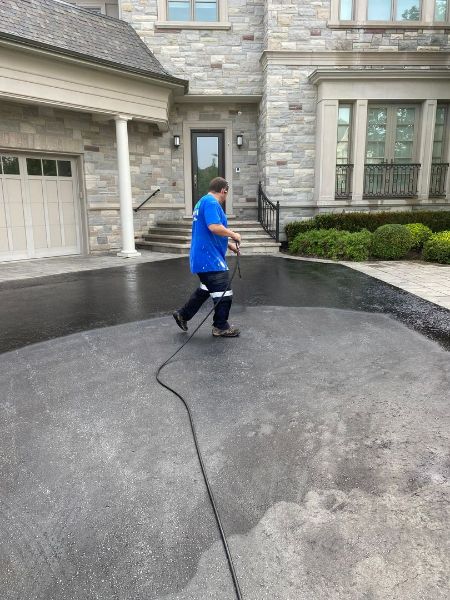Unleash the Possible: Regrading and Asphalt Sealing for Industrial Spaces
Unleash the Possible: Regrading and Asphalt Sealing for Industrial Spaces
Blog Article
Warm Mix Asphalt: A Lasting Option for Sidewalk
Warm Mix Asphalt (HMA) has arised as a leading lasting option for pavement services, supplying a myriad of cutting-edge innovations and environmental advantages. Its capability to reuse materials and lower energy consumption presents an engaging situation for its fostering in road building and construction projects. The long-term efficiency and toughness of HMA make it a recommended choice for facilities advancement. As the need for green building methods expands, checking out the nuances of HMA's sustainability can give important insights right into the future of pavement services.
Ecological Benefits of Warm Mix Asphalt

Additionally, Warm Mix Asphalt aids to mitigate urban warm island effects. Its dark shade takes in sunshine, minimizing the quantity of warm reflected back right into the atmosphere contrasted to lighter-colored sidewalks. This can decrease ambient temperatures in metropolitan locations, lowering the need for air conditioning and inevitably reducing power intake.
Furthermore, Warm Mix Asphalt adds to improved stormwater monitoring. Its permeable nature permits water to penetrate the sidewalk and charge groundwater products, decreasing overflow and the threat of flooding. These ecological advantages make Hot Mix Asphalt a lasting selection for leading roadways and freeways.
Power Performance in HMA Production
Is power effectiveness a vital variable in the manufacturing of Warm Mix Asphalt (HMA)? Power plays a considerable function in the manufacturing of HMA, influencing both expense and environmental sustainability. One vital aspect of energy effectiveness in HMA manufacturing is the usage of warm mix asphalt (WMA) technologies.
Moreover, developments in plant modern technologies have actually led to more energy-efficient HMA manufacturing procedures. By optimizing power usage in HMA production, the sector can minimize its carbon footprint while maintaining high-quality pavement materials.
Recyclability of Warm Mix Asphalt
The recyclability of Hot Mix Asphalt (HMA) is an essential element of its sustainability and long-term ecological influence. HMA is just one of one of the most recycled products in the United States, with over 100 million lots of recovered asphalt sidewalk (RAP) being reused each year in new sidewalk building and construction. Recycling HMA provides numerous environmental advantages, such as minimizing the need for virgin materials, lowering energy consumption during manufacturing, and decreasing the amount of waste sent to garbage dumps.
The process of recycling HMA entails milling the existing sidewalk, squashing it right into smaller pieces, and blending it with brand-new accumulation and asphalt binder to create a recycled mix. Generally, the recyclability of HMA plays a considerable duty in promoting lasting techniques within the sidewalk sector.

Long-Term Efficiency of HMA
Asphalt pavements demonstrate longevity and strength over a prolonged period, showing the lasting performance of Hot Mix Asphalt (HMA) The longevity of HMA can be associated to its ability to hold up against hefty website traffic tons, rough climate condition, and the impacts of aging. Studies have shown that well-designed and correctly constructed HMA sidewalks can last for 20 years or even more with normal upkeep. The secret to making the most of the long-term efficiency of HMA hinges on making use of high-quality products, adhering to finest methods in building why not try these out and construction, and implementing effective upkeep methods. Proper water drainage, regular examinations, and timely repair work are essential for maintaining the structural integrity of HMA sidewalks in time. Additionally, innovations in HMA innovation, such as making use of polymer-modified binders and cozy mix asphalt, have even more boosted the toughness and durability of HMA pavements. By prioritizing quality building and maintenance techniques, HMA proceeds to show itself as a lasting and economical remedy for durable pavement facilities.

HMA: Sturdiness and Sustainability
Demonstrating both toughness and sustainability, Warm Mix Asphalt (HMA) has come to be a keystone in the building and construction of long-lasting pavement facilities - commercial parking lot paving. HMA's resilience comes from its capability to stand up to hefty click for info loads, severe climate conditions, and high web traffic quantities, making it a reputable choice for streets, highways, and airport terminal paths. The composition of HMA, which normally consists of aggregates, binder, and filler, plays an essential duty in boosting its longevity and resistance to tear and wear
Additionally, HMA's sustainability depends on its recyclability and link energy-efficient production procedure. The capability to recycle redeemed asphalt pavement (RAP) in brand-new HMA combinations decreases the demand for virgin materials and decreases the environmental impact of pavement building and maintenance. Additionally, the energy performance of generating HMA exists in its reduced mixing temperatures contrasted to various other sidewalk materials, resulting in decreased power consumption and greenhouse gas emissions.
Verdict
In conclusion, hot mix asphalt (HMA) provides a sustainable remedy for pavement with its environmentally pleasant attributes. HMA's recyclability, power performance in production, and long-lasting longevity make it an eco-friendly selection for road building and construction.
HMA is one of the most recycled products in the United States, with over 100 million tons of reclaimed asphalt sidewalk (RAP) being reused yearly in brand-new pavement construction.The procedure of recycling HMA entails grating the existing sidewalk, crushing it right into smaller pieces, and blending it with new accumulation and asphalt binder to create a recycled mix.Asphalt sidewalks demonstrate resilience and resilience over a prolonged period, mirroring the long-term efficiency of Hot Mix Asphalt (HMA) Furthermore, developments in HMA innovation, such as the use of polymer-modified binders and cozy mix asphalt, have additionally enhanced the durability and durability of HMA sidewalks. The capacity to reuse recovered asphalt sidewalk (RAP) in new HMA blends reduces the demand for virgin products and reduces the ecological influence of pavement building and construction and upkeep.
Report this page